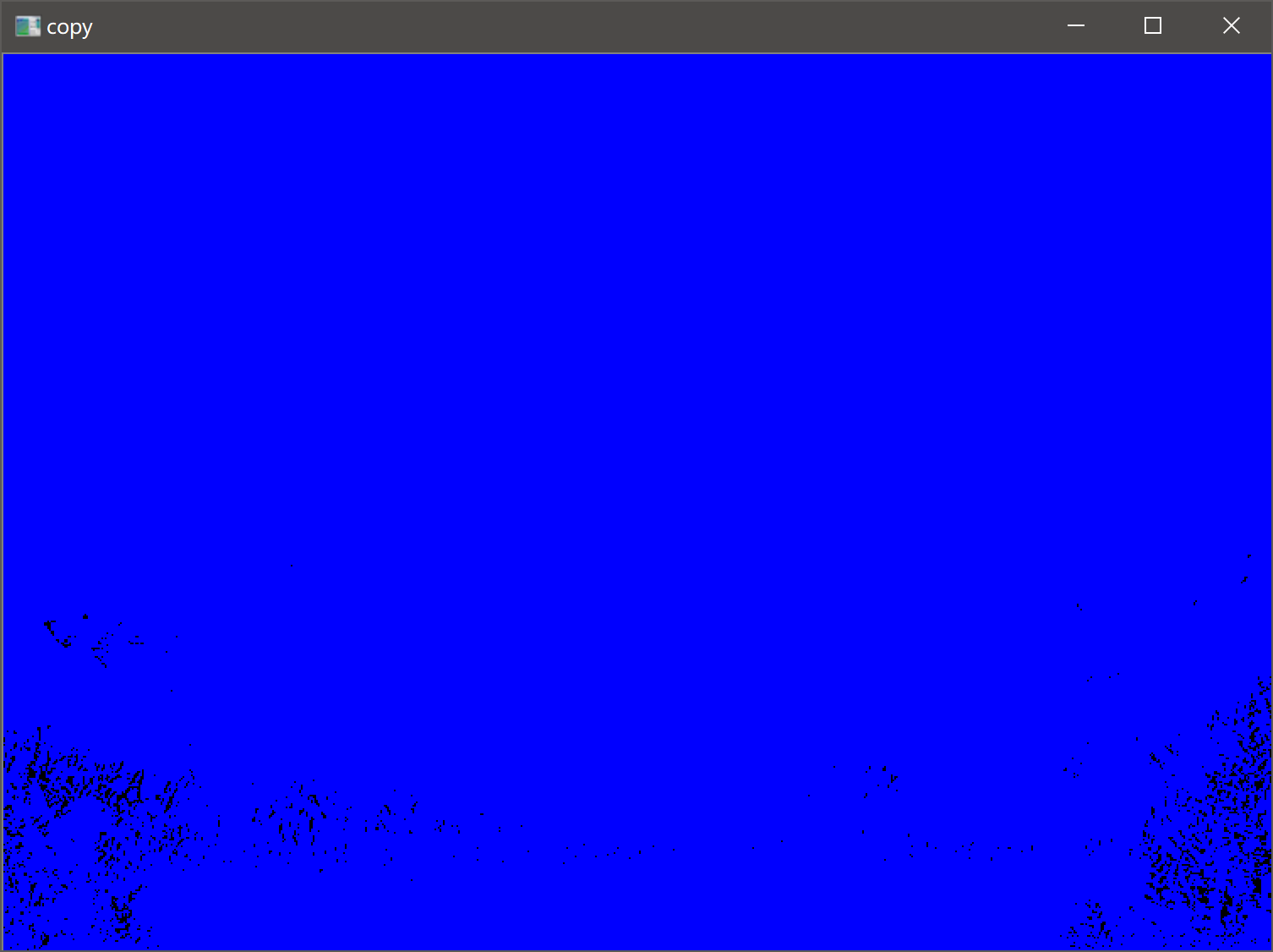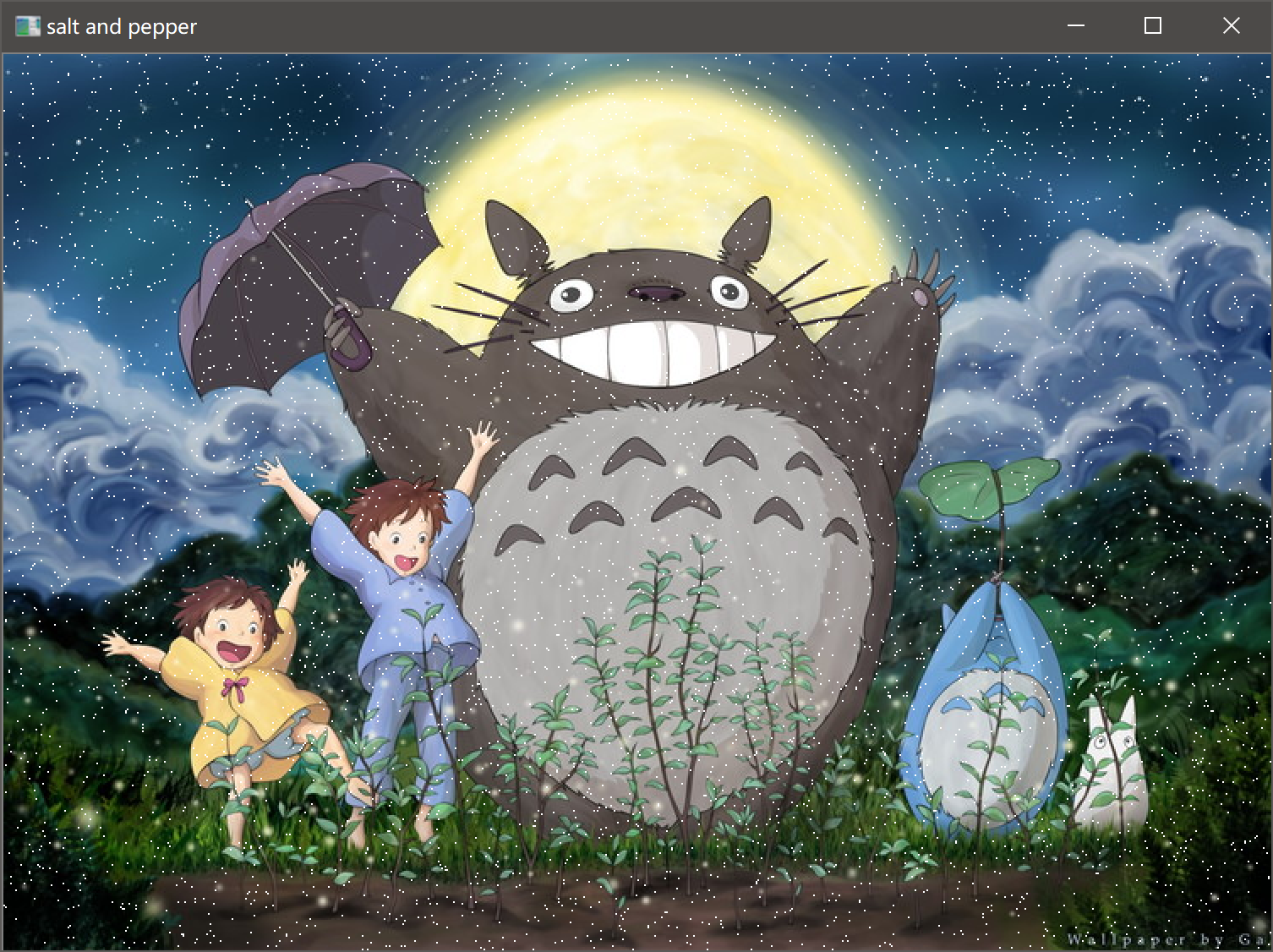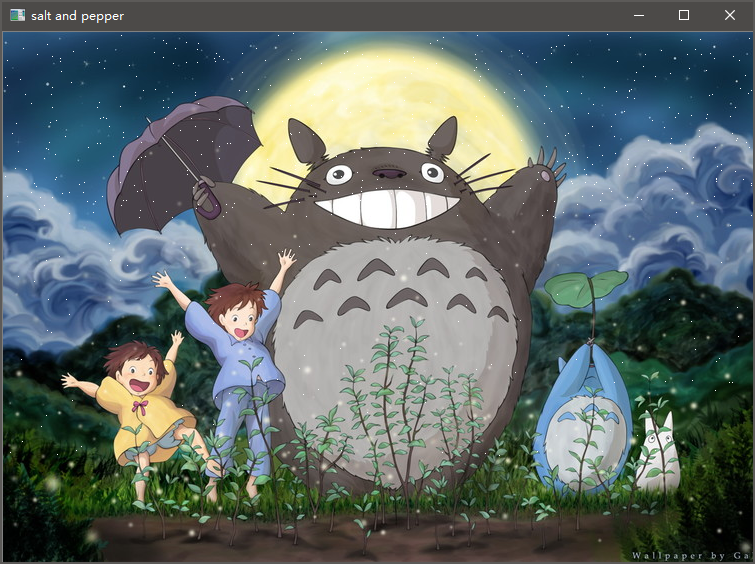基于python的OpenCV图像1
1. 读入图片并显示
import cv2
img = cv2.imread("longmao.jpg")
cv2.imshow("longmao", img)
cv2.waitKey(0) #等待按键,0表示永久等待
cv2.destroyAllWindows() #完成之后销毁窗体

2. RGB通道分离
基于numpy数组的方法
r = img[:, :, 2]
g = img[:, :, 1]
b = img[:, :, 0]
注意:OpenCV读取的顺序是BGR。
**基于OpenCV的RGB通道分离
b, g, r = cv2.split(img) #得到三个通道的值
b = cv2.split(img)[0]
3. RGB通道分离
img2 = cv2.merge([b, g, r])
4. 单像素处理
img[9, 9, 2] #通过数组索引的方式获取某个像素值,
#获取第10行,第10列(从0开始)的单独R颜色分量
5. 遍历图像
img = cv2.imread("longmao.jpg")
img2 = np.zeros(img.shape)
for i in range(img.shape[0]):
for j in range(img.shape[1]):
img2[i, j, 0] = img[i, j, 0] #b分量
#img2[i, j, 1] = img[i, j, 1] #g分量
#img2[i, j, 2] = img[i, j, 3] #R分量
#img2[i, j] = cv2.merge([img2[i, j, 0], img2[i, j, 1], img2[i, j, 2]])
cv2.imshow("copy", img2)
cv2.waitKey(0)
cv2.destroyAllWindows() #完成之后销毁窗体
图片的蓝色分量显示

5. 给图片添加椒盐噪声
import numpy as np
import cv2
def addPepperAndSalt(img, n):
img2 = img
for i in range(n):
x = int(np.random.random() * img.shape[0])
y = int(np.random.random() * img.shape[1])
img2[x, y, 0] = 255
img2[x, y, 1] = 255
img2[x, y, 2] = 255
return img2
img = cv2.imread("longmao.jpg")
img2 = addPepperAndSalt(img, 5000)
cv2.imshow("salt and pepper", img2)
cv2.waitKey(0)
cv2.destroyAllWindows()
注:np.random.random():返回[0.0, 1)的随机数,默认是一个,括号里面可以选返回随机数的数量

6. 添加椒盐噪声进阶版
import cv2
import numpy as np
def peppersalt(img, n, m):
"""
Add peppersalt to image
:param img: the image you want to add noise
:param n: the total number of noise (0 <= n <= width*height)
:param m: different mode
m=1:add only white noise in whole image
m=2:add only black noise in whole image
m=3:add black and white noise in whole image
m=4:add gray scale noise range from 0 to 255
m=5:add color noise in whole image,RGB is combined randomly with every channel ranges from 0 to 255
:return: the processed image
"""
img2 = img
if m == 1:
for i in range(n):
x = int(np.random.random() * img.shape[0])
y = int(np.random.random() * img.shape[1])
img2[x, y, 0] = 255 #添加白色噪声
img2[x, y, 1] = 255
img2[x, y, 2] = 255
elif m == 2:
for i in range(n):
x = int(np.random.random() * img.shape[0])
y = int(np.random.random() * img.shape[1])
img2[x, y, 0] = 0 #黑色
img2[x, y, 1] = 0
img2[x, y, 2] = 0
elif m == 3:
for i in range(n):
x = int(np.random.random() * img.shape[0])
y = int(np.random.random() * img.shape[1])
flag = np.random.random() * 255 #随机添加白色或黑色
if flag > 128:
img2[x, y, 0] = 255
img2[x, y, 1] = 255
img2[x, y, 2] = 255
else:
img2[x, y, 0] = 0
img2[x, y, 1] = 0
img2[x, y, 2] = 0
elif m == 4:
for i in range(n):
x = int(np.random.random() * img.shape[0])
y = int(np.random.random() * img.shape[1])
flag = int(np.random.random() * 255) #随机颜色
img2[x, y, 0] = flag
img2[x, y, 1] = flag
img2[x, y, 2] = flag
elif m == 5:
for i in range(n):
x = int(np.random.random() * img.shape[0])
y = int(np.random.random() * img.shape[1])
f1 = int(np.random.random() * 255) #彩色
f2 = int(np.random.random() * 255)
f3 = int(np.random.random() * 255)
img2[x, y, 0] = f1
img2[x, y, 1] = f2
img2[x, y, 2] = f3
return img2
if __name__ == "__main__":
img = cv2.imread("longmao.jpg")
img = peppersalt(img, 500, 5)
cv2.imshow("salt and pepper", img)
cv2.waitKey(0)
cv2.destroyAllWindows()
7. 实现下雪demo

def snow2pic(img, n):
"""
:param img: input a rgb picture
:param n: density of the snow
:return: the pic with snow in the top
"""
#length, width = img.shape
#top_length = length * 0.35
for i in range(n):
x = int(np.random.random() * img.shape[0] * 0.35)
y = int(np.random.random() * img.shape[1])
img[x, y, 0] = 255 # 添加白色噪声
img[x, y, 1] = 255
img[x, y, 2] = 255
for i in range(200):
x = int(np.random.random() * img.shape[0] * 0.8)
y = int(np.random.random() * img.shape[1])
img[x, y, 0] = 255 # 添加白色噪声
img[x, y, 1] = 255
img[x, y, 2] = 255
return img
if __name__ == "__main__":
img = cv2.imread("longmao.jpg")
img = snow2pic(img, 400)
cv2.imshow("salt and pepper", img)
cv2.waitKey(0)
cv2.destroyAllWindows()



 浙公网安备 33010602011771号
浙公网安备 33010602011771号